Crafting websites that feel intuitive, engaging, and user-friendly? That’s the magic of user experience (UX)! The User Experience for the Web course unlocks the secrets of designing interfaces that users love, empowering you to create digital experiences that drive engagement and success.
Whether you’re a web designer, product manager, or simply passionate about creating user-centric websites, this program equips you with the fundamental principles and practical tools to elevate your online creations.
But the path to UX mastery isn’t a one-size-fits-all journey. Let’s dive into a range of captivating alternatives, exploring diverse learning styles, specific industry needs, and budget considerations…
Overview: User Experience For The Web (WebUX)
This course is thoughtfully designed to immerse learners in the expansive field of User Experience (UX) for web design and development. Tailored for aspiring UX designers, web developers seeking to enhance their design skills, or complete novices interested in creating intuitive and impactful web experiences, this course offers an in-depth exploration of the principles, tools, and practices essential for designing user-centric websites and applications.
Through a combination of theoretical insights and practical exercises, students will delve into the nuances of UX design, learning how to craft websites that look great and provide seamless and enjoyable user interactions.
Course Syllabus Preview:
The course syllabus is meticulously organized to cover a wide range of topics crucial for anyone looking to excel in UX design for the web. Here’s a glimpse of the major topics and their subtopics:
I. Introduction To User Experience Design
- The Importance of UX in the Digital Age
- History and Principles of UX Design
- Understanding User Needs and Behaviors
II. UX Research And Strategy
- Techniques for User Research and Analysis
- Developing User Personas and Journey Maps
- Information Architecture and Content Strategy
III. Designing For Usability
- Principles of Usable Web Design
- Heuristics and Usability Testing
- Accessibility and Inclusive Design
IV. Interaction Design And Prototyping
- Basics of Interaction Design
- Wireframing and Prototyping Tools
- Conducting User Testing and Feedback Loops
V. Visual Design For The Web
- Fundamentals of Visual Hierarchy and Layout
- Color Theory and Typography
- Responsive and Mobile-first Design
VI. Implementing UX Design with Web Technologies
- HTML/CSS Basics for UX Designers
- Introduction to JavaScript for Interactive Prototypes
- Integrating UX with Front-end Development
VII. UX Writing and Content Strategy
- Crafting Effective Web Copy
- Content Strategy for Engagement
- Voice and Tone in UX
VIII. Analytics and Performance
- Measuring User Experience with Analytics
- Performance Optimization for UX
- A/B Testing and Iterative Design
IX. The Business of UX Design
- UX in the Product Development Process
- Communicating UX Design to Stakeholders
- Building a UX Portfolio
What You Will Learn
By enrolling in this course, you will gain:
- A Deep Understanding of UX Principles: Learn the foundational concepts of user experience design and how to apply them to web projects.
- Research and Strategy Skills: Master techniques for understanding user needs and translating insights into effective design strategies.
- Design and Prototyping Expertise: Get hands-on experience with tools for wireframing, prototyping, and user testing to refine and validate your designs.
- Visual Design Knowledge: Explore the elements of visual design to create aesthetically pleasing and functional web interfaces.
- Technical Skills for Implementation: Understand the basics of web technologies that are crucial for bringing UX designs to life.
- Content Strategy and Writing: Learn how to craft compelling content and effective UX writing to enhance user engagement.
- Analytical Abilities: Gain insights into using analytics and performance data to inform and improve the user experience.
This Course Includes:
- 18 Hours of On-Demand Video: Engaging video lectures that cover the full spectrum of UX design for the web.
- 4 Comprehensive Articles: In-depth written materials to supplement your learning and provide deeper insights into key topics.
- 8 Downloadable Resources: Access to templates, checklists, and guides to support your design process.
- Access on Mobile and TV: Flexible learning options that allow you to study from anywhere at any time.
- Certificate of Completion: A testament to your hard work and newly acquired skills, enhancing your professional credibility.
Top 5 Alternatives Of The User Experience For The Web Course
Based on the search results, here are the top 5 alternatives to User Experience for the Web courses online:
1. Coursera – Web Design For Everybody: Basics Of Web Development & Coding Specialization
| Course Link | Here |
| Pricing | Free |
This specialization by the University of Michigan covers the basics of HTML, CSS, and JavaScript, as well as responsive web design.
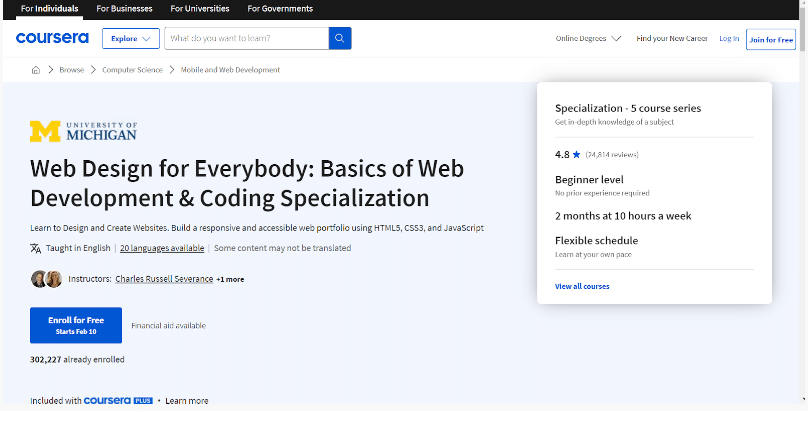
What does it offer?
The specialization provides a comprehensive understanding of web design principles and best practices, with a focus on user experience for the web.
What will I learn?
Participants will learn about the key concepts and tools used in web design, as well as how to create user-friendly and visually appealing web experiences.
Where could this lead me?
This knowledge can lead to opportunities in web design, front-end development, and user experience design.
2. WebFlow University: Ultimate Web Design Course
| Course Link | Here |
| Pricing | Free |
This free course offered by WebFlow University is an ultimate web design course that includes over 5 hours of video lessons.
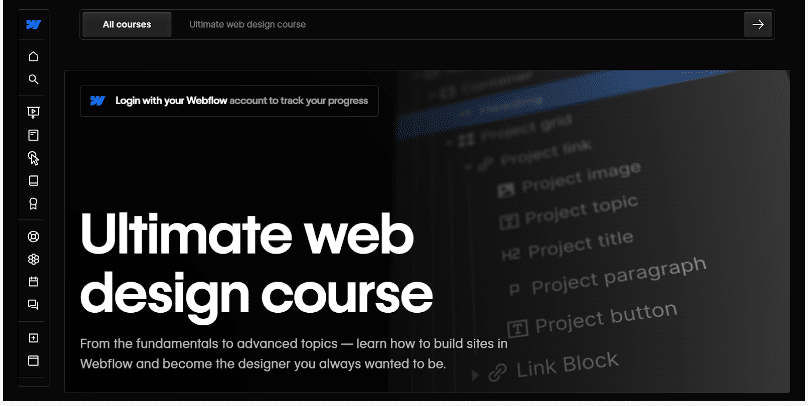
What does it offer?
The course offers a comprehensive overview of web design, covering topics such as layout, typography, and visual hierarchy, with a focus on user experience.
What will I learn?
Participants will learn about the key principles and best practices in web design, as well as how to create user-friendly and visually appealing web experiences.
Where could this lead me?
This knowledge can lead to opportunities in web design, user experience design, and front-end development.
3. Interaction Design Foundation – Formal Design Methods
| Course Link | Here |
| Pricing | Free for members |
The Interaction Design Foundation offers a variety of online courses in interaction design, user experience design, and web design.
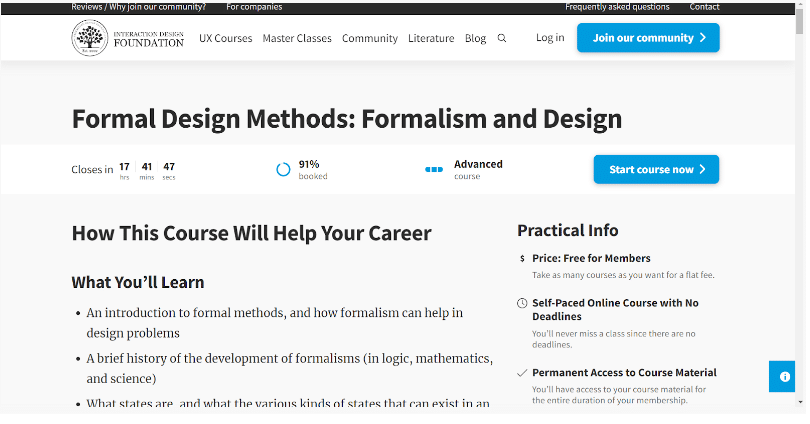
What does it offer?
The platform provides a comprehensive understanding of user experience design principles and best practices, with a focus on designing for the web.
What will I learn?
Participants will learn about the key concepts and tools used in user experience design, as well as how to create user-friendly and effective web experiences.
Where could this lead me?
This knowledge can lead to opportunities in user experience design, web design, and front-end development.
4. Springboard – UI/UX Design Bootcamp
| Course Link | Here |
| Pricing | $11,900 |
Springboard offers a comprehensive UI/UX Design Bootcamp with a focus on real-world projects and a personalized learning experience.
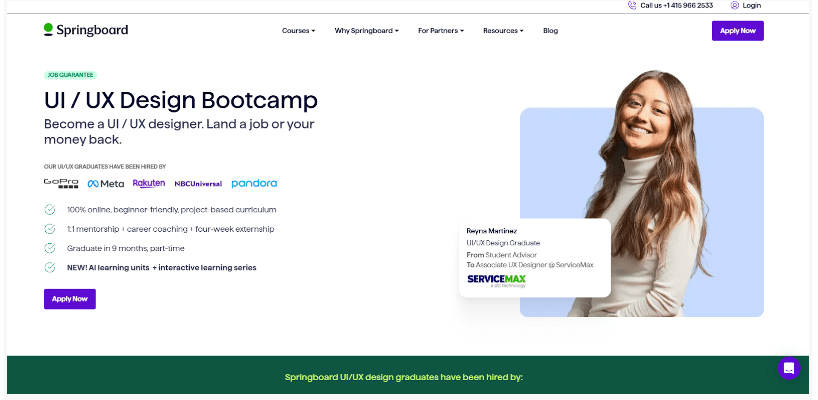
What does it offer?
Students are assigned a personal mentor and work on hands-on projects to build a professional portfolio. The course covers user research, prototyping, and interaction design, preparing students for a career in UI/UX design[1].
What will I learn?
Participants will learn about the key principles and best practices in UI/UX design, as well as how to create user-friendly and visually appealing web experiences.
Where could this lead me?
This knowledge can lead to opportunities in UI/UX design, web design, and front-end development.
5. Skillshare – UX Design Fundamentals: Everything You Need to Know
| Course Link | Here |
| Pricing | Free |
Skillshare offers a comprehensive course on UX Design Fundamentals, covering everything from user research to wireframing and prototyping.
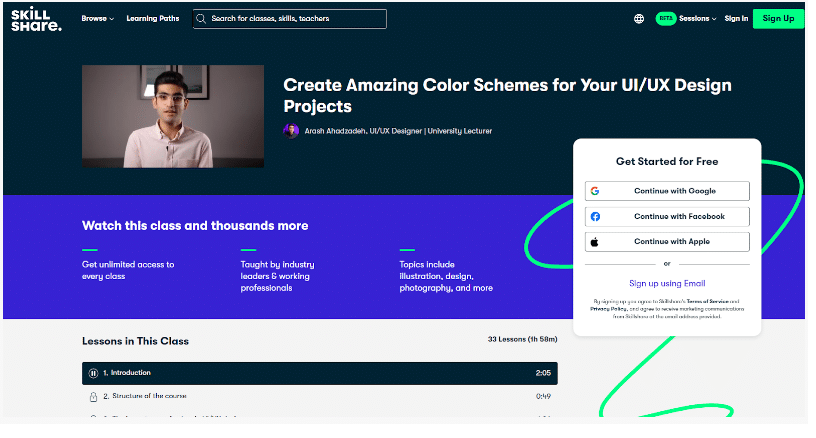
What does it offer?
The course is suitable for beginners and provides a solid foundation in UX design principles and best practices. With a subscription, students can access a wide range of design courses on the platform.
What will I learn?
Participants will learn about the key concepts and tools used in UX design, as well as how to create user-friendly and effective web experiences.
Where could this lead me?
This knowledge can lead to opportunities in UX design, web design, and front-end development.
Conclusion
Remember, the optimal User Experience for the Web learning experience is as unique as the websites you’ll design.
Explore the various courses, workshops, and online resources available, considering your preferred learning style, budget, and industry focus. Don’t be afraid to experiment and find an approach that resonates with you.
Embrace the principles, hone your skills, and step into the world of UX with confidence. Remember, every click and interaction tells a story – become the storyteller who crafts meaningful journeys that captivate your users.
So, embark on this enriching journey, unlock the power of UX, and watch your websites come alive with user-friendly brilliance!
Article By
